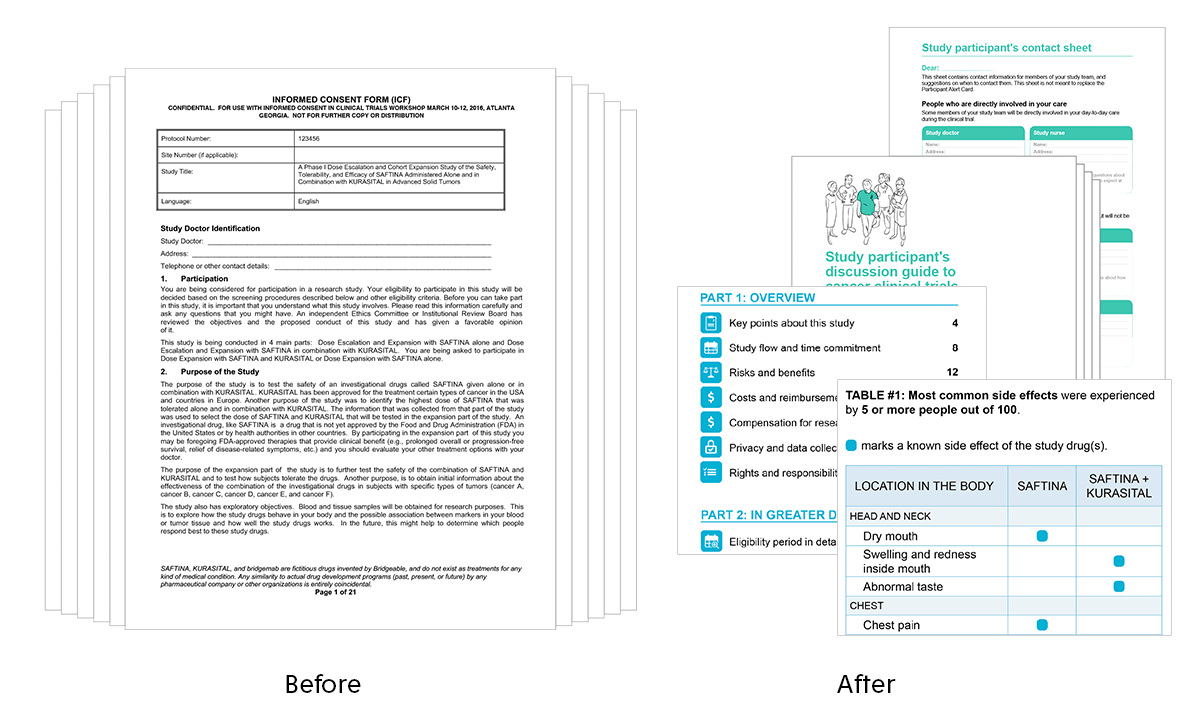
Work Bridgeable
Reimagining the informed consent experience in clinical trials
Problem
How to make the Informed Consent Form (ICF) easier to navigate and understand for clinical trial participants
Solution
A hands-on co-creation session that engaged diverse stakeholders, and the application of Universal Patient Language (UPL) principles to the ICF and consent process
Impact
A redesigned ICF template that is more patient friendly and that facilitates greater participant understanding and engagement
Author
- Bridgeable
Client
- Bristol-Myers Squibb
The informed consent form: A unique challenge for patients
Over the past decade or so, the healthcare system has undergone radical change, moving away from traditional models of care toward a more patient-centric approach. While this shift presents a unique opportunity for patients to be more engaged in their own care than ever before, it is not without its own set of challenges. With more decisions to make and complex information to understand, patients can feel lost and confused by the system.
A group that frequently encounters these challenges consist of patients who are considering participating in clinical trials. Since the primary purpose of clinical trials is to study new investigational drugs and how people react to them, it is extremely important for anyone considering participation in a clinical trial to understand their role in the process. They must acknowledge the potential for exposure to unknown risks. And they must recognize that the treatment they receive may be very different from the standard practices they are familiar with and that they may not receive any individual benefit from it.

I would feel so much more empowered to make the decision with the redesigned ICF compared to what I was presented.
Former clinical trial participant

According to FDA guidelines, to make an informed decision about whether or not to participate in a clinical trial, people need to be informed about:
- What will be done to them
- How the protocol (plan of research) works
- What risks or discomforts they may experience
- That participation is voluntary
This information is provided to potential participants through a process known as informed consent. Before entering into a clinical trial, patients must sign a document known as the informed consent form, or ICF. However, for many patients, navigating the complexity of this document—which is typically highly detailed and written in specialized medical and legal language—can be challenging.
Our client, Bristol-Myers Squibb (BMS), recognized that improving the informed consent experience could have disproportionately positive benefits to both the sponsor and patients, so they engaged us to help them reimagine the ICF through a patient-centred lens.
This looks like a big step forward. The redesigned ICF makes the document engaging and welcoming to read and makes me want to learn more about the clinical trial.
Caregiver for former clinical trial participant
Co-creating an improved informed consent experience
We began the process of redesigning the ICF by organizing a hands-on co-creation session with a diverse group of stakeholders, including former clinical trial participants, caregivers, healthcare professionals, bioethicists, visual communication experts, and Institutional Review Board staff.
During the co-creation, the different stakeholders worked together, listened to each other, and suggested improvements to both the ICF and the informed consent process as a whole. Bridgeable left the session with prototypes for how the ICF could be redesigned as well as prototypes of supporting materials to supplement the informed consent process.
In refining the prototypes for validation, we applied the principles of the Universal Patient Language (UPL)—a constantly evolving set of resources developed by BMS and Bridgeable to help communicate complex topics to patients—to ensure the language was accessible and participant-friendly. After validating the UPL-informed design and features of the ICF with an additional set of former clinical trial participants, caregivers, and study staff, we took the feedback we received and finalized the design.
I think that the redesigned ICF is pretty great and it captures all of the key points. I believe it would be helpful for the study team and not just the patient.
Clinical trial site staff
Changing the way BMS approaches clinical trials
Our outputs included an updated ICF template that can be updated and adapted to any specific clinical trial. This ICF has new elements such as a welcome letter and a table of contents, as well as improvements to the organization of many traditional sections such as risks and procedures. It is written in more participant-friendly language, and the information is presented in a way that is more inviting to read and conducive to learning. The template has since been used to inform other clinical trials at BMS.
Through this work, BMS and Bridgeable changed the informed consent process within BMS, with the ultimate aim of spreading this change throughout the industry.
For more information on the Informed Consent Experience, visit the links below:
Author
- Bridgeable
Client
- Bristol-Myers Squibb
For more information on the Informed Consent Experience, visit the links below: